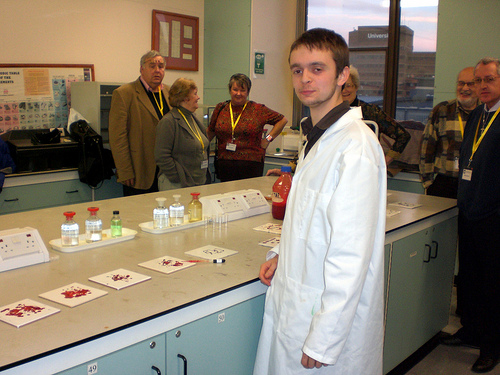5 Things Most Cop Shows Get Wrong About Forensics


Those cop shows. You’ve got to love them. Week after week, they bring viewers to the edge of their seats with the next morbid tale of murder, serial killing, and crime scene horror stories. Forensics has especially become a hot topic what with the numerous reincarnations of CSI to keep people tuning in, providing a behind-the-scenes look at how the good guys get the bad guys by gathering evidence. Detectives and scientists swoop in, analyze the data, and save the day. There’s only one problem. Most of the time, television has got it all wrong. Here are the top five, forensic mistakes they make week after week.
1. Forensic scientists and police officers are not one in the same.
When it comes to weekly episodes of crime shows, the police are pulling double-duty, gathering forensic evidence, studying in the lab by night, pounding the pavement by day. In truth, forensic scientists are a separate entity. They are not licensed police officers. Their only job is to make sense of the data they collect and study in the lab.
2. Science isn’t always right.
When it comes to the world of acting and hourly programs, science cannot be denied. There is always absolute proof to stand on, based on the findings from the lab. In reality, things are not so clear cut. DNA and fingerprints, the most popular forms of evidence gathered on television, may help to narrow down the field, but they do not provide one hundred percent, without a doubt proof. As we all know, if there is any room at all to question any evidence, it is tossed out the window. Remember OJ Simpson and the gloves that wouldn’t fit?
3. Results are not instantaneous.
Tune into a favorite crime show and the lab has the results within minutes. Nothing could be further from the truth. Forensic science is a slow, time-consuming process. It can actually take over a month before results are back in about various pieces of evidence. Meanwhile, the suspects are out on bail.
4. Evidence is often contaminated.
On television, everything falls into place without mishap. Superhero cops happen to have a forensic kit on hand, get the essential evidence, and wrap up the investigation within seconds. In reality, many crime scenes are bungled. Mistakes are made when law officers handle the evidence improperly or other individuals have access to the scene, contaminating the evidence. When forensic evidence is not handled properly, it can cancel the validity of any findings. In addition, it can head scientists down the wrong trail if too many people get their hands on the evidence. Crime scene errors can mean releasing someone in custody or an acquittal for a suspect.
5. Forensic science is not glorious.
In television, the life of the forensic scientist is filled with fast-paced action and technological gadgets that are simply amazing. In reality, it is a hurry up and wait kind of world. Forensic experts are tucked in their labs, studying data, without interaction with the detectives. They have long, tedious hours. They are not blessed with access to so many wonders in equipment, although they probably wish they could go to the “As Seen on TV” shop to fill up their labs with all of the good stuff.
 License: Creative Commons image source
License: Creative Commons image sourceLelia Garrison is a forensic examiner and blogger who recently contributed to the online Criminal Justice Major Guide.
